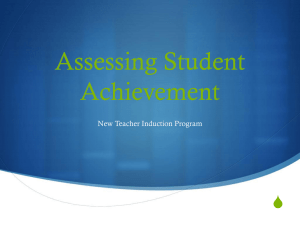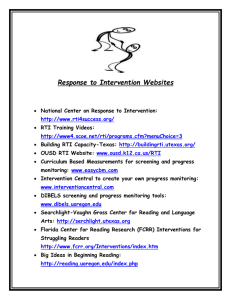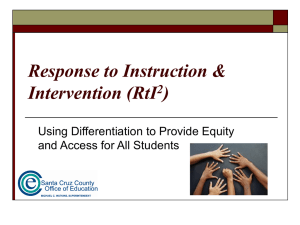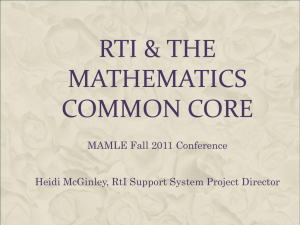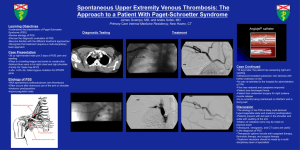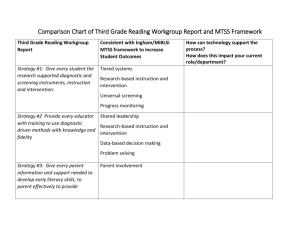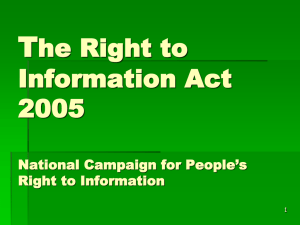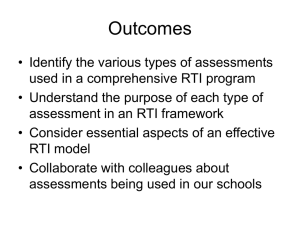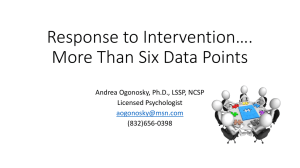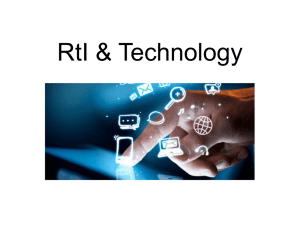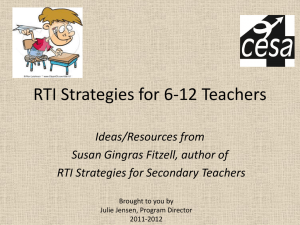Webinar PowerPoint Slides - Center on Response to Intervention
advertisement
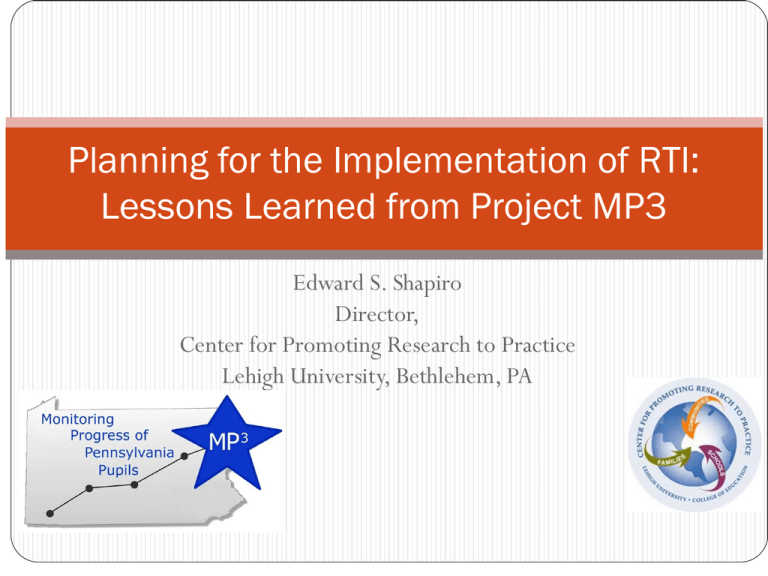
Planning for the Implementation of RTI: Lessons Learned from Project MP3 Edward S. Shapiro Director, Center for Promoting Research to Practice Lehigh University, Bethlehem, PA Initial Planning Stage Implementation would require change Rethink how instructional decisions made Change is difficult! Comprehensive planning was critical to success of project Selection of Schools Roll out of Model Professional development and training Sustainability Preparation began several months prior to implementation Assessing Readiness for Change Prior to planning, evaluated district’s level of readiness “Creative Tension” (Green & Ethridge, 2001) evident District administration recognized importance of RTI Internal evaluation- current practices not sufficient RTI implemented in only 1 of 13 schools DIBELS data collected but not used Year Prior to Implementation Develop Model Meet with District Administration Meet with Building Administration Meet with School 1 Staff Meet with School 2 Staff Meet with School 3 Staff First Year of Implementation Professional Development For School 1 Training with Core Team Coaching No Intervention for School 2 and School 3 Consultation and Support Second Year of Implementation Professional Development Session with All Schools Schools 2 & 3 PD Sessions Core Team Training Coaching Consultation and Support Core Team Teaching Coaching Consultation and Support Professional DevelopmentSchool 1 • School year prior to implementation – 4- 45 minute sessions with entire staff • Summer prior to implementation – 5 days with data team – 2 days with entire staff prior to start of school • During first implementation year – 7- 45 minute sessions throughout school year – 2- 2 hour in-services – 1- full day training Professional DevelopmentSchools 2 & 3 • School year prior to implementation – 1- 2 hour in-service with entire staff – 2- 45 minute sessions with staff – 1-full day training • Summer prior to implementation – 5 days with data team – 2 days with entire staff prior to start of school • During first implementation year – 2- 2 hour in-services – Training conducted by district staff at additional professional development sessions Initial Planning Meeting Held 8 months prior to implementation in schools All stakeholders involved Key administrators from district PaTTAN Project Staff Discussed topics related to planning Overview of model Proposed timeline Identified participating schools School level needs Readiness for change Building leadership Presentation of Model to schools Meeting with Principals Met with principals from three participating schools Provided overview of model Question and Answer Discussed Professional Development Needs Discussed how to present to staff Staff Meetings Met with teachers at each building Provided overview of project Question and Answer Teachers completed staff development survey Results used to plan future professional developments Professional Development Ongoing throughout the course of project Attempted to provide as much training prior to implementation as possible Started with four 45 minute sessions held in Spring of year prior to implementation Session 1:Overview and Question and Answer Session 2-4: Developed based on results of needs assessment Professional Development Results of PD surveys indicated that teachers wanted additional training in use of data to make instructional decisions PD sessions focused on Rationale for data-based decision making Methods for using data to guide instruction Opportunities to practice Additional Professional Development Week long training in summer for data team Data team members to serve as facilitators Principal, Reading Specialist, Instructional Support Teacher, School Psychologist, Key Teachers 1 per grade, 1 Special Ed teacher Training topics Progress Monitoring AIMSweb Data Analysis and Interpretation Data-based decision making Additional Professional Development Two day training for all staff at start of school year Progress monitoring 5 Big Ideas of reading instruction Interventions: Tiered interventions Provided multiple opportunities for discussion and practice Met with some resistance Teacher concerns – “Can’t make decisions off of numbers.” “How can we fit this in a day of school?” “How much time will we waste moving kids around the school?” “Extra work placed on classroom teacher, like progress monitoring?” Additional Professional Development Additional sessions held throughout the school year Contracted 2 meetings per month prior to school- One was grade level meeting, One was professional development Differentiated Instruction Vocabulary Instruction AIMSweb Advanced data analysis Interventions Sessions conducted by school staff to promote sustainability Worked with Reading Specialist, IST with our help and support so they could continue after we left Professional Development Sessions Skills built upon those presented in the past reviewed info from past sessions provided practice with learned skills introduced new information In vivo training and support provided throughout the course of the project Always followed didactic with in-classroom mentoring, coaching, modeling Not always Lehigh staff, could also be district personnel with our support Needs assessed and support faded when possible to facilitate sustainability Assessment of Readiness Use the RTI Readiness and Implementation Self-Assessment Staff at school rate the components We also rated each school Ratings represent collective viewpoints of primary stakeholders RTI Self Assessment ToolSchool 1 – Implemented 2 years Standards Aligned Curriculum Universal Screening Shared Ownership Data-based Decision making Tiered Interventions Parent Engagement Behavior Eligibility Determination Leadership Professional Development SA 2.8 3.0 3.0 3.0 3.0 2.3 1.0 2.5 3.0 3.0 SA= Self Assessment; PSS= Project Staff Assessment PSS 2.5 3.0 3.0 2.4 3.0 2.5 1.0 2.5 2.7 3.0 RTI Self Assessment ToolSchool 2 – Implemented 1 year Standards Aligned Curriculum Universal Screening Shared Ownership Data-based Decision making Tiered Interventions Parent Engagement Behavior Eligibility Determination Leadership Professional Development SA 2.3 3.0 2.5 2.8 3.0 1.8 2.0 3.0 3.0 3.0 SA= Self Assessment; PSS= Project Staff Assessment PSS 2.3 2.7 1.0 2.0 2.2 2.3 1.2 2.0 2.3 2.2 RTI Self Assessment ToolSchool 3 – Implemented 1 year Standards Aligned Curriculum Universal Screening Shared Ownership Data-based Decision making Tiered Interventions Parent Engagement Behavior Eligibility Determination Leadership Professional Development SA 2.8 3.0 2.5 2.8 2.8 2.3 1.6 2.5 3.0 2.6 SA= Self Assessment; PSS= Project Staff Assessment PSS 2.8 2.7 3.0 3.0 2.8 1.3 1.4 2.5 2.7 2.2 Disclaimer This webinar was made possible by the support of the U.S. Department of Education Office of Special Education Programs. Opinions expressed herein are those of the authors and do not necessarily represent the position of the U.S. Department of Education.
